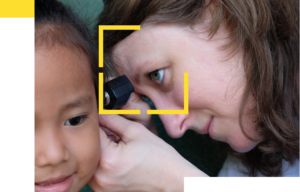Audra Reyni: Putting an invisible disability on the map
This is one in a series of profiles of the winners of the 2018 Governor General’s Innovation Awards. See all honourees.

Hearing loss affects 1.3 billion people around the world, and 80 percent of them live in developing countries. Yet the condition remains little known and understood. Montreal social entrepreneur Audra Renyi is shining a light on this “invisible disability” through technology, market incentives and rapid training. Her goal is to break the stigma that prevents hearing- impaired people, especially children, from reaching their full potential.
Renyi, 35, began on a much different career path, which included a business degree from The Wharton School, University of Pennsylvania, and working as an investment banker on Wall Street. But she “always wanted to help the world in some way.” She quit her job in 2007 to volunteer and eventually work in international development, where she then had a chance encounter with Claudio Bussandri, a Canadian business leader who had suffered his whole life from profound bilateral hearing loss. In 2011, the two founded the non-profit World Wide Hearing Foundation International, based in Montreal.
Hearing loss hits close to home for Renyi; both her father and aunt are severely hearing impaired. Her father was also influential as an entrepreneur, she says, giving her “both know-how and business principles such as flexibility and total integrity, courage and perseverance.”
Driven by a goal to address the social, economic and cultural consequences of hearing loss, Renyi, who speaks six languages, is putting hearing loss on the global agenda. The 180 million children with hearing problems in developing countries are stigmatized and face isolation, she notes. Parents sometimes even keep them out of school.
“The goal is not to make buckets of money, but to be sustainable and help millions of hearing-impaired people. Finding patients, and finding them soon, is critical. I get excited about being able to help kids in particular. If you can help one child, even just one child, and connect them to the world, that’s what really makes a difference.”
She obtained funding to carry out hearing screenings on more than 100,000 children in Peru, Guatemala, the Philippines, Vietnam and Jordan, to ensure they receive hearing aids or are referred to doctors for medical and surgical intervention. This model is also being brought back to help Canada’s northern Indigenous communities. Studies show 30 percent of Inuit children suffer from hearing loss.
Renyi has applied her strengths in finance to hearing loss. In 2014 she founded earAccess Inc., a for-profit social enterprise that provides affordable hearing aids and mobile hearing test equipment. She says competitor prices for the devices are kept high; her company has its own cheaper brand of hearing aids, called ACCESS. “The goal is to do good while doing business,” she explains.
One difficulty was the absence of data on hearing impairments and the impact of hearing aids among poor people. Renyi set up the open-access Global Hearing Loss Database, in consultation with entities like the World Health Organization and the European Hearing Instrument Manufacturers Association, to undertake studies in countries such as Guatemala. She persuaded Google.org to fund a search for inexpensive field technologies for hearing screenings in remote communities. “That put us on the map,” she says.
Barriers include the lack of recognition of hearing loss and scant funding. “We’re starting to see the needle move a little bit on that,” she says. Another challenge is protectionist regulations that suppress competition, keeping hearing aid prices high; World Wide Hearing fights this tough battle each day, country by country.
“You need to have solid nerves for good entrepreneurship,” Renyi says. “Even with a lot of institutional and government assistance, there were moments when I felt very lonely, facing seemingly insurmountable problems.”
She’s motivated by support from the community, hearing-loss groups and individuals, such as a girl named Jana from High Level, Alberta, who wears hearing aids. She wrote Renyi to say her school raised $2,000 for World Wide Hearing through bake sales, glow-in-the-dark dances and other events.
“I was deeply moved by Jana’s gesture,” Renyi says. “Her actions — and her classmates’ determination and generosity — show that hearing loss is a cause that resonates, that touches all walks of life, in every country on every continent.”
The money raised has been used to bring hearing aids to children in Guatemala, Renyi reports. World Wide Hearing visited Jana’s school recently to screen the students for hearing loss, to say thank you. “May these children never sit on the sidelines and may they continue to change the world, one step at a time,” she says.





